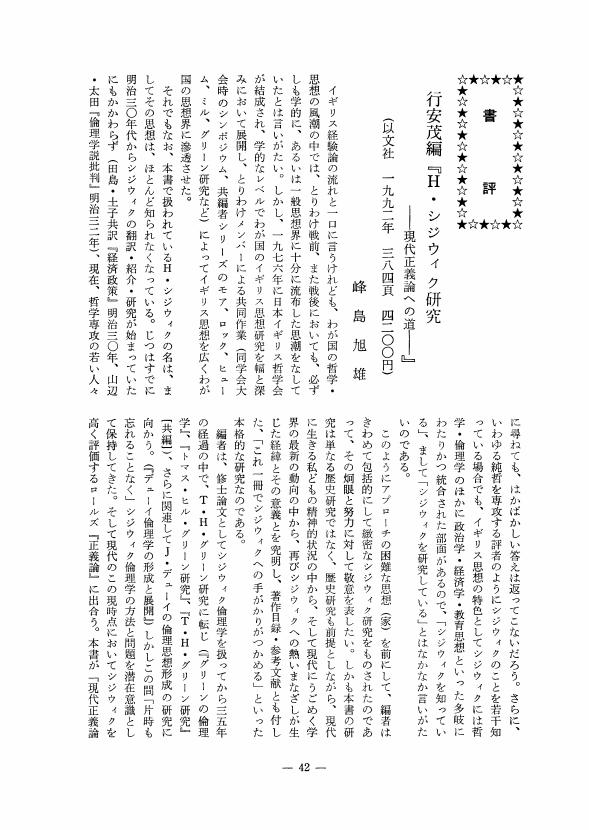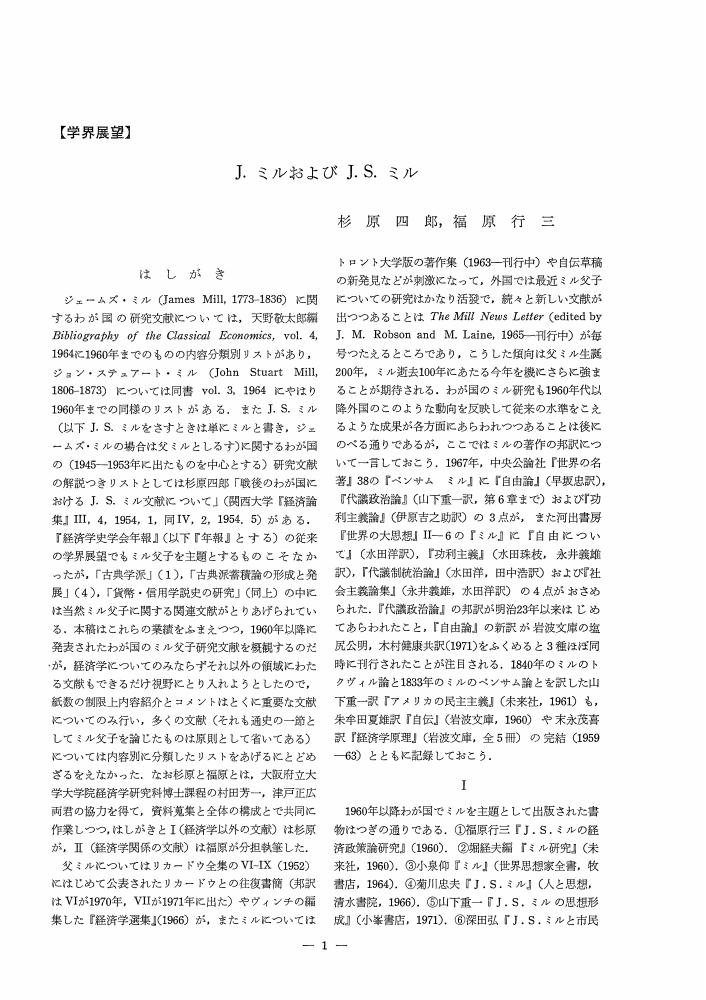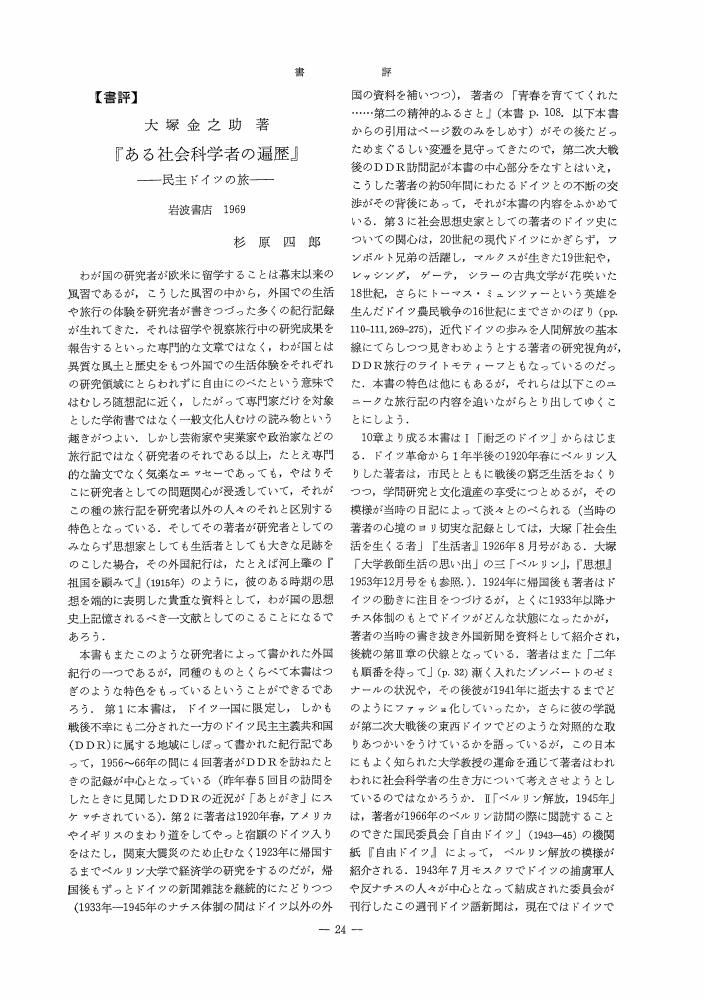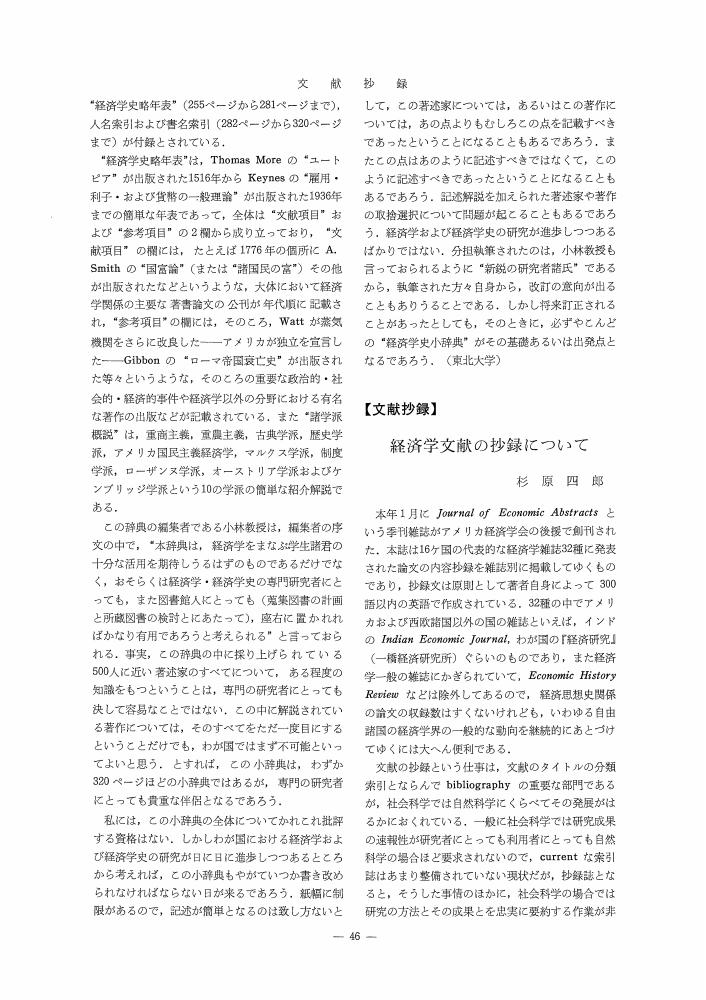- 著者
- 杉原 四郎
- 出版者
- 経済学史学会
- 雑誌
- 経済学史学会年報 (ISSN:04534786)
- 巻号頁・発行日
- vol.43, no.43, pp.114-115, 2003 (Released:2010-08-05)
1 0 0 0 OA [資料紹介] 経済学者の追悼文集拾遺
- 著者
- 杉原 四郎
- 出版者
- 關西大学經済學會
- 雑誌
- 關西大學經済論集 (ISSN:04497554)
- 巻号頁・発行日
- vol.41, no.6, pp.1195-1207, 1992-03-15
1 0 0 0 OA 書評
1 0 0 0 IR 福田徳三と河上肇 (河上肇生誕100年記念号)
- 著者
- 杉原 四郎
- 出版者
- 京都大學經濟學會
- 雑誌
- 経済論叢 (ISSN:00130273)
- 巻号頁・発行日
- vol.124, no.5, pp.p223-242, 1979-12
1 0 0 0 OA マルクスの経済本質論に関する一考察
- 著者
- 杉原 四郎
- 出版者
- 關西大学經済學會
- 雑誌
- 關西大學經済論集 (ISSN:04497554)
- 巻号頁・発行日
- vol.13, no.1-2, pp.1-19, 1963-06-20
1 0 0 0 OA 回顧と展望 ―日本イギリス哲学会創立二〇周年によせて―
1 0 0 0 OA 英学復興
- 著者
- 杉原 四郎
- 出版者
- 日本イギリス哲学会
- 雑誌
- イギリス哲学研究 (ISSN:03877450)
- 巻号頁・発行日
- vol.10, pp.29-33, 1987-04-01 (Released:2018-06-25)
1 0 0 0 OA 杉原四郎 J.S.ミルと現代
- 著者
- 杉原 四郎 松井 名津 橋本 昭一 Robert Chapeskie
- 出版者
- The Japanease Society for the History of Economic Thought
- 雑誌
- 経済学史研究 (ISSN:18803164)
- 巻号頁・発行日
- vol.60, no.1, pp.100-136, 2018 (Released:2019-09-03)
Introduction by Shoichi Hashimoto Shiro Sugiharaʼs “Nature, Human Beings, and Labour,” translated here into Eng-lish, was originally published in Japanese in J. S. Miru to Gendai (J. S. Mill and the Present Day), 1980, Tokyo: Iwanami Shoten, and reprinted in Volume 2, 2003, of The Works of Shiro Sugihara, 4 Volumes, 2003-, Tokyo: Fujiwara Sho-ten. Shiro Sugihara (1920-2009) began his study of the history of economic thought with a comparison of Karl Marx and J. S. Mill. While he does not ex-plicitly mention it in any of his writings, in this he may have been influenced by his mentor, Kei Shibata (1902-1986). Shibata had been attempting to further develop Marxʼs theory of reproduction using the methods of general equilibrium theory. While carefully tracing the process of development of Marxʼs economic thought, by explicating Marxʼs crit-icism of Mill Sugihara played a major role in the post-war Japanese movement to re-evaluate Mill, who had historically received only low appraisal. Sugihara presented Millʼs stance of engaging with contemporary economic issues in a positive light, an approach that is given full expression in the essay translated here. While Japanese readers would not require any explanation regarding Sawako Ariyoshi (1931-1984), the novelist who appears at the start of the es-say, she was a writer who raised new social issues such as synthetic pollution, food damage, issues related to the elderly, and so on, that have since become common knowledge, posing them to society in a series of works written in rapid succession that all went on to become bestsellers. As a result of the nature of her writing she was ignored by various literary awards.
1 0 0 0 OA 日本経済思想史研究のこれまでと今
- 著者
- 杉原 四郎
- 出版者
- The Japanese Society for the History of Economic Thought
- 雑誌
- 経済学史学会年報 (ISSN:04534786)
- 巻号頁・発行日
- vol.38, no.38, pp.28-36, 2000 (Released:2010-08-05)
- 参考文献数
- 9
In his pioneering synthesis, published in 1962, on the Japanese political economists of the Tokugawa (1603-1868) and the Meiji (1868-1912) periods, Eijiro Honjo outlined the development of the study of the history of Japanese economic thought in evolutionary stages. Starting from its beginning in the Meiji, he argued that a foundation was laid for the study of the Tokugawa economic thought in the Taisho (1912-1925) period, while the Meiji economic thought began to become a serious subject of study in the early Showa period, and prewar socialist and Marxist thoughts after the Second World War. Thus the field exhibited a steady expansion in terms of the scope of the subject, the number of scholars and the number of works published. However, Honjo also commented that such a development was dwarfed by the publication of a much larger number of works on the history of Western economic thought, because Japanese universities offered research and teaching posts for the latter, but seldom for the former.This was indeed the case at least up to the 1960s. The History of Economic Thought Society of Japan started in 1950 with 123 members, but the total number of papers presented at the Society's biannual meetings on Japanese history during the first five years was as little as seven. Central themes chosen in these meetings usually related to the history of classical political economy and Marxian economics. Almost no attempts had been made to take up a theme centring on Japan. Some members, including myself, did express concern about this state of affairs. Thus, after returning from the study in Europe in 1957-58, I tried to arouse interest in the subject by starting a newsletter for the Kansai branch of the Society in 1959. In 1966-69 a number of researchers, led by Tsuneo Hori, joined the government-funded project on the study of the history of Japanese modernisation since the Meiji, which greatly helped promote the field.At its 42nd meeting in November 1978, the Society chose the history of modern Japanese economic thought as a central theme for the first time. The three papers presented in the session discussed the thought and activities of Yukichi Fukuzawa, Shiro Shiba and the Japan Society of Social Policy, respectively, and another three papers on the Tokugawa economic thought were presented in the subsequent individual sessions of this meeting. Reflecting the growth of the number of people seriously interested in the field, this meeting signified the Society's open acknowledgement of the central importance of the study of the Japanese experience for the discipline as a whole. Since then the Society has organised three major publications, each marking the steady development of the field; Nihon no Keizaigaku (The Political Economy in Japan) (1984), Keizaigakushi: Kadai to Tenbo (The History of the Political Economy: Its Missions and Prospects) (1992) and Economic Thought and Modernisation in Japan (1998). Furthermore, the Society's 63rd meeting in November 1999 showed a high standard of scholarship, making the future of the field appear promising. Four excellent papers were presented by the younger generation of scholars, with new source material and perspectives. I could not help recalling Honjo's lecture delivered 60 years ago at Kyoto University, in which he lamented the poor interest in the subject within the discipline. We have come quite a long way.
1 0 0 0 OA 日本経済思想史
- 著者
- 坂本 武人 杉原 四郎
- 出版者
- The Japanese Society for the History of Economic Thought
- 雑誌
- 経済学史学会年報 (ISSN:04534786)
- 巻号頁・発行日
- vol.17, no.17, pp.1-11, 1979 (Released:2010-08-05)
1 0 0 0 OA 経済学史学会の30年を語る
- 著者
- 堀 経夫 出口 勇蔵 小林 昇 水田 洋 久保 芳和 杉原 四郎 田中 敏弘
- 出版者
- The Japanese Society for the History of Economic Thought
- 雑誌
- 経済学史学会年報 (ISSN:04534786)
- 巻号頁・発行日
- vol.17, no.17, pp.12-21, 1979 (Released:2010-08-05)
1 0 0 0 OA トロント大学におけるミル父子記念学会
- 著者
- 杉原 四郎
- 出版者
- The Japanese Society for the History of Economic Thought
- 雑誌
- 経済学史学会年報 (ISSN:04534786)
- 巻号頁・発行日
- vol.12, no.12, pp.23, 1974 (Released:2010-08-05)
1 0 0 0 OA J. ミルおよびJ. S. ミル
- 著者
- 杉原 四郎 福原 行三
- 出版者
- The Japanese Society for the History of Economic Thought
- 雑誌
- 経済学史学会年報 (ISSN:04534786)
- 巻号頁・発行日
- vol.11, no.11, pp.1-10, 1973 (Released:2010-08-05)
1 0 0 0 OA 大塚金之助著『ある社会科学者の遍歴』-民主ドイツの旅-岩波書店 1969
- 著者
- 杉原 四郎
- 出版者
- The Japanese Society for the History of Economic Thought
- 雑誌
- 経済学史学会年報 (ISSN:04534786)
- 巻号頁・発行日
- vol.8, no.8, pp.24-26, 1970 (Released:2010-08-05)
1 0 0 0 OA 経済学史研究の原点を顧みて
- 著者
- 堀 経夫 住谷 悦治 内田 義彦 杉原 四郎 河野 健二 平田 清明
- 出版者
- The Japanese Society for the History of Economic Thought
- 雑誌
- 経済学史学会年報 (ISSN:04534786)
- 巻号頁・発行日
- vol.3, no.3, pp.18-32, 1965 (Released:2010-08-05)
1 0 0 0 OA J. S. Mill の著作集について
- 著者
- 杉原 四郎
- 出版者
- The Japanese Society for the History of Economic Thought
- 雑誌
- 経済学史学会年報 (ISSN:04534786)
- 巻号頁・発行日
- vol.2, no.2, pp.31-34, 1964 (Released:2010-08-05)
1 0 0 0 OA 経済学文献の抄録について
- 著者
- 杉原 四郎
- 出版者
- The Japanese Society for the History of Economic Thought
- 雑誌
- 経済学史学会年報 (ISSN:04534786)
- 巻号頁・発行日
- vol.1, no.1, pp.46-47, 1963 (Released:2010-08-05)
1 0 0 0 OA [資料紹介] 続 経済学者の追悼文集(五)
- 著者
- 杉原 四郎
- 出版者
- 關西大学經済學會
- 雑誌
- 關西大學經済論集 (ISSN:04497554)
- 巻号頁・発行日
- vol.44, no.4, pp.725-740, 1994-10-30
1 0 0 0 IR [書評] スタンリー・ムーア著『マルクスにおける三つの革命論』
- 著者
- 杉原 四郎
- 出版者
- 關西大学經済學會
- 雑誌
- 關西大學經済論集 (ISSN:04497554)
- 巻号頁・発行日
- vol.18, no.2, pp.221-230, 1968-06-20












